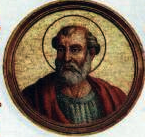St Cornelius and St Ninian

Pope and martyr. A Roman priest, Cornelius was elected Pope to succeed Fabian in an election delayed fourteen months by Decius' persecution of the Christians.
One of the main issues of his pontificate was the treatment of Christians who had abandoned their faith during the persecution.
He condemned those confessors who were lax in not demanding penance of these Christians. On the other hand, he also denounced the Rigourists, headed by Novatian, a Roman priest, who declared that the Church could not pardon lapsed Christians, and declared himself Pope - the first antipope.
Cornelius proclaimed that the Church had the authority and the power to forgive repentant lapsed Christians, and could readmit them to the sacraments and the Church after they had performed proper penances.
A synod of Western bishops in Rome in October 251 upheld Cornelius, condemned the teachings of Novatian, and excommunicated him and his followers.
When persecutions of the Christians started up again in 253 under Emperor Gallus, Cornelius was exiled to Centum Cellae (Civita Vecchia), where he died a martyr.
Some of his relics were taken to Germany during the Middle Ages. His head was claimed by Kornelimunster Abbey near Aachen.
He is patron saint of the town of Kornelimunster as well as a patron of cattle, domestic animals, people who suffer from earache and epilepsy.
and Saint Ninian
A 5th century British bishop and apostle in Whithorn and Galloway, St Ninian is traditionally also known as the 'Apostle of the Picts.'
A number of inscribed Christian stones have been discovered by archeologists around Galloway, which indicate that St Ninian lived there. Bede refers to him living at a monastery in the area near a church painted white. An anonymous 8th century poet wrote about him and the 12th century Ailred of Rievaulx wrote a life of this Scottish saint.
His shrine was a popular pilgrimage place for centuries, surviving up to the Reformation. By that time his cult had also spread to Kent and Denmark. In recent years pilgrims have again begun returning to Whithorn, and a special pilgrimage takes place on the last Sunday of August. Since 1984, excavations have revealed a site of major importance.
Read more about Whithorn and St Ninian here: www.historicenvironment.scot/visit-a-place/places/whithorn-priory-and-museum/












